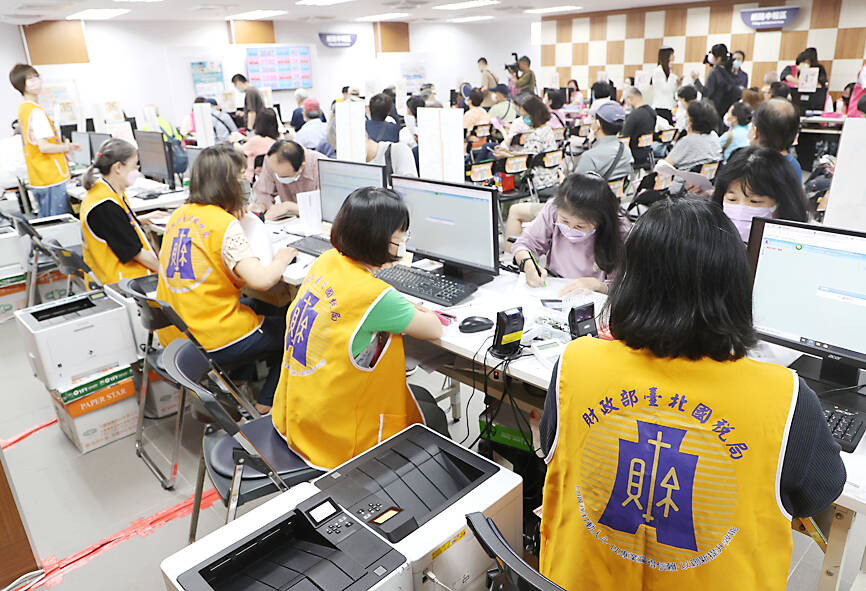The basic living expense tax deduction has been raised to NT$210,000 (US$6,457) from NT$202,000 and is to be applicable during the tax season in May next year, the Ministry of Finance said yesterday.
The ministry announced the adjustment on its Web site, saying that the move is expected to benefit about 2.08 million households, while affecting the nation’s tax income by NT$2.6 billion (US$79.9 million).
The Taxpayer Rights Protection Act (納稅者權利保護法) came into effect at the end of 2017, which stipulates that people should not be taxed on the amount they need to cover basic living expenses.

Photo: CNA
The basic living expenses are set at 60 percent of the median disposable income per capita from the preceding year, the ministry said.
A survey released on Aug. 16 by the Directorate-General of Budget, Accounting and Statistics showed that the median disposable income last year was NT$349,359, making the basic living expenses NT$210,000.
The deduction, which can be applied to taxpayers and each of their dependents, is NT$8,000 more than last year, the ministry said.
Meanwhile, the ministry on Nov. 23 last year announced that it would increase other income tax deductions this year to help ease people’s financial burden amid inflationary pressure, which would lower the nation’s tax income by NT$21.7 billion when people file their taxes next year, it had estimated.
It came as the rise in the consumer price index had exceeded the standard 3 percent for adjustments of tax exemptions, standard deductions, special deductions for salary income and for people with physical and mental disabilities, as well as tax brackets, the ministry said.
These tax exemptions and deductions are to cost state coffers NT$24.3 billion in total, it said.

The Taiwanese passport ranked 33rd in a global listing of passports by convenience this month, rising three places from last month’s ranking, but matching its position in January last year. The Henley Passport Index, an international ranking of passports by the number of designations its holder can travel to without a visa, showed that the Taiwan passport enables holders to travel to 139 countries and territories without a visa. Singapore’s passport was ranked the most powerful with visa-free access to 192 destinations out of 227, according to the index published on Tuesday by UK-based migration investment consultancy firm Henley and Partners. Japan’s and

NATIONAL SECURITY THREAT: An official said that Guan Guan’s comments had gone beyond the threshold of free speech, as she advocated for the destruction of the ROC China-born media influencer Guan Guan’s (關關) residency permit has been revoked for repeatedly posting pro-China content that threatens national security, the National Immigration Agency said yesterday. Guan Guan has said many controversial things in her videos posted to Douyin (抖音), including “the red flag will soon be painted all over Taiwan” and “Taiwan is an inseparable part of China,” while expressing hope for expedited “reunification.” The agency received multiple reports alleging that Guan Guan had advocated for armed reunification last year. After investigating, the agency last month issued a notice requiring her to appear and account for her actions. Guan Guan appeared as required,

Japan and the Philippines yesterday signed a defense pact that would allow the tax-free provision of ammunition, fuel, food and other necessities when their forces stage joint training to boost deterrence against China’s growing aggression in the region and to bolster their preparation for natural disasters. Japan has faced increasing political, trade and security tensions with China, which was angered by Japanese Prime Minister Sanae Takaichi’s remark that a Chinese attack on Taiwan would be a survival-threatening situation for Japan, triggering a military response. Japan and the Philippines have also had separate territorial conflicts with Beijing in the East and South China

A strong cold air mass is expected to arrive tonight, bringing a change in weather and a drop in temperature, the Central Weather Administration (CWA) said. The coldest time would be early on Thursday morning, with temperatures in some areas dipping as low as 8°C, it said. Daytime highs yesterday were 22°C to 24°C in northern and eastern Taiwan, and about 25°C to 28°C in the central and southern regions, it said. However, nighttime lows would dip to about 15°C to 16°C in central and northern Taiwan as well as the northeast, and 17°C to 19°C elsewhere, it said. Tropical Storm Nokaen, currently